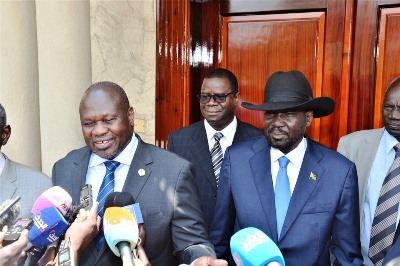US warns South Sudan may face sanctions over unity government
October 10, 2019 (WASHINGTON) – The United States may consider imposing sanctions on South Sudan if the country’s rival leaders fail to form national unity government, a senior official warned Thursday.

“We’re not prepared to continue to see delays, we’re not prepared to continue to hear arguments for why more time must be given,” Bryan Hunt, Sudan and South Sudan office director at the State Department reportedly told reporters at the US Institute of Peace.
“Our view is that if the government is not formed by November 12, we’re going to need to re-evaluate the relationship between the United States and South Sudan,” he added.
South Sudan descended into war in mid-December 2013 when President Salva Kiir accused his former deputy Riek Machar of plotting a coup, allegations the latter dismissed.
In September 2018, the rival factions involved in the conflict signed a peace deal to end the conflict that has killed tens of thousands of people and displaced over 2 million people in the country.
The rival parties, in May, agreed to form a power-sharing unity government as part of a deal to end the war by November 12.
Hunt, however, said Washington is not considering broader sanctions targeting South Sudan’s economy, like its oil, because they would risk worsening the plight of people who live in a country that partly depends on foreign aid for survival.
He said the international community should act to end violence in South Sudan.
“We believe that international sanctions are the strongest message to send to South Sudan,” said Hunt, citing UN sanctions as an option.
Meanwhile, experts have warned that exerting pressure on the leadership in Juba may lead to an internal standoff among senior political and military figures, citing what occurred in July 2016.
The experts, in a paper published on the US Institute for Peace (USIP) website, argued that the armed opposition, some of which refused to sign the 2018 agreement, may seize an opportunity and step up attacks on government positions throughout the country.
“Major violence erupts again in Juba and elsewhere, people once again flee settled areas, whether to the bush, U.N.-administered protection of civilian sites, or to neighboring countries, only adding to the population of nearly four million displaced persons in South Sudan,” partly reads the paper authored by David Deng and Aly Verjee.
On Tuesday, the United Nations Security Council urged parties to the revitalized peace agreement in South Sudan to resolve outstanding substantive issues needed for formation of a transitional national unity government.
(ST)
